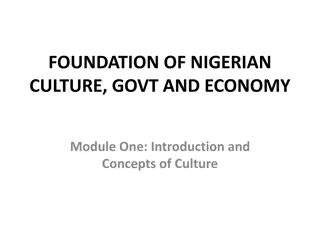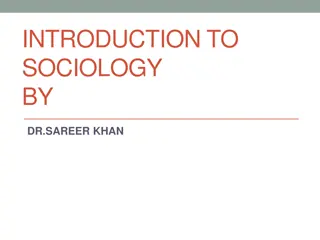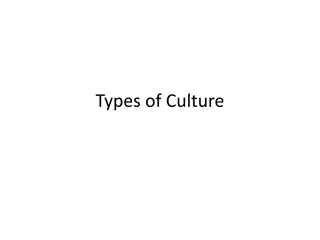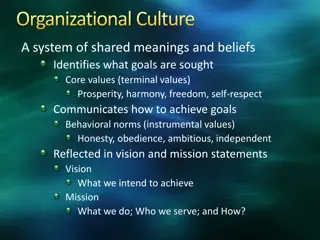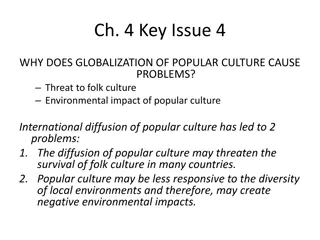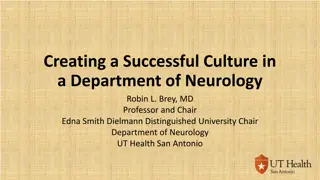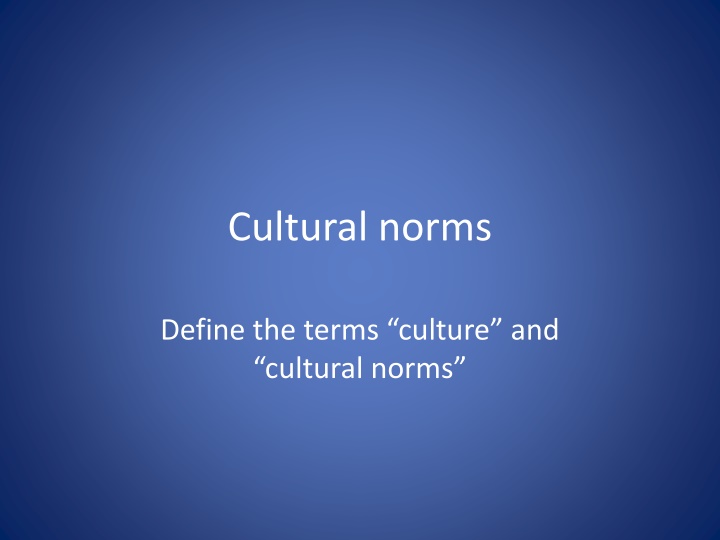
Cultural Norms and Definitions in Society
Explore the definitions of culture and cultural norms, along with various aspects encompassing race, art, traditions, and more. Delve into the different ways culture is discussed and gain insights into the socio-psychological constructs that shape shared meanings within societies.
Download Presentation

Please find below an Image/Link to download the presentation.
The content on the website is provided AS IS for your information and personal use only. It may not be sold, licensed, or shared on other websites without obtaining consent from the author. If you encounter any issues during the download, it is possible that the publisher has removed the file from their server.
You are allowed to download the files provided on this website for personal or commercial use, subject to the condition that they are used lawfully. All files are the property of their respective owners.
The content on the website is provided AS IS for your information and personal use only. It may not be sold, licensed, or shared on other websites without obtaining consent from the author.
E N D
Presentation Transcript
Cultural norms Define the terms culture and cultural norms
Culture Race, nationality, ethnicity Music, art, literature, drama, dance Food, clothing, housing, technology, transport Economy, work, Leisure, family life, sex Welfare, religion, science Rites of passage, rituals, ceremonies, traditions customs, heritage
Kroeber and Kluckholn (1952) 161 defintions Six ways in which people discuss culture: Descriptive; activities and behaviours Historical; heritage and tradition Normative; rules and norms Psychological; learning, problem soling , behavioural approaches within a group of people Structural; societal and organisational elements Genetic; origins of a certian group of people
What is culture? A socio-psychological construct a relatively organised system of shared meanings Smith and Bond (1993) collective programming of the mind which distinguishes members of one group from another. Hofstede (1980) a set of the attitudes, values, beliefs and behaviours shared by a group of people, but different for each individual, communicated from one generation to the next (Matsumoto 1996) Linked concepts we have discussed before? Enculturation
Shared meanings in Chinese crisis means new opportunities and love can mean infatuation, unrequited, and sorrow and is seen as suspicious, illicit and socially disruptive in Japan work refers not just to your job but implies time spent in leisure pursuits with colleagues as well. What do these differences suggest about differing representations of the world or differing values?
Caution! Cole (1995) calls for caution in conceptualising culture in psychology since appeal to a generally accepted (let alone the correct ) definition is almost certainly a hopeless enterprise (p.31). Definitions reflect assumptions, theoretical orientation and interests in particular aspects of the world. Our own assumptions about what culture is may not reflect another societies assumptions
Further Cautions! David Matsumoto (1996) Culture... Cannot be swallowed in a single gulp! (Malpass 1993) Can t be learnt in a book, a uni course or a trinaing programme the breadth and scope are enormous in all its richness and complexity, is huge
Studying culture scientifically Difficult; culture is abstract; can t be observed directly only inferred from what people do and say (manifestations of culture) A theoretical/conceptual entity that helps explain observed behavioural differences He behaves like that because of his culture; what is his culture, well its the difference in the way he behaves (Problem?) Can we change a culture? Start by changing people's behaviour/language?
Link between culture and behaviour Match between extent to which people's behaviour is similar and reflects cultural norms is not exact Some cultures are more homogenous than others, behaviour matches the norms more precisely Tight and loose cultures (Pelto, 1968) Why might some cultures be looser than others?
Cultural norms rules for living; prescriptions for correct behaviour social standards of accepted, expected and appropriate behaviour passed from one generation to the next may or may not coincide with laws and policies, e.g., driving five miles above the speed limit strength and consequence for violation may vary lack of norms = anomie (sociological idea) cultural norms create meaning and coherence in life; allow a group to achieve a sense of integrity, safety and belonging Cultural norms ensure adaptive behaviour; gradually change as environments change; cultural evolution (kosher food, parasitic diseases)


